JENNIFER LUKE, FNSB School Board President: First on the list is Sandi Ryan. This is the one I moved you to, correct? If you will state your name, spell your last name, state your area of residence, you will have two minutes to testify.
SANDI RYAN, FEA President: Thank you, ma'am. Good evening, again. My name is Sandi Ryan. I'm a 29-year mathematics and computer science teacher here in Fairbanks and I currently serve as the Fairbanks Education Association president. I reside in Fairbanks, and the spelling of my last name is R-Y-A-N.
I think it was the last school board meeting of the year, last May, [where] a discussion was opened about reorganizing current board […] committees. It is often a good thing to look at structure, evaluate what works and what does not work. Healthy and often productive outcomes. However, the conversation began to question why FEA, ESSA, and FPA should have input in some of the committees, why employee groups should have a seat at the table?
This caused me […] to kind of scratch my head. Why would an organization not want to have input from their employees as to what was working and not working, and how to maybe make it better [before] it boils over? Why would any organization want to systematically cut out an opportunity to get meaningful input from employees willing to give their time after work hours in order to make the organization better?
This was especially puzzling for an education organization. It is not the School Board nor administration that delivers instructions. It is the teachers, counselors, librarians, therapists and psychologists that are in the trenches and understand what is currently working. It is the principles that put out the daily, sometimes hourly, fires and buildings to once again allow those educators to do their job. And finally, it is our support staff professionals that hold us together, making sure that the path is clear to get those teaching professions into practice.
Yes, ladies and gentlemen, you are charged with adopting policy and setting priorities. But attempting to develop those without the input of your professional staff is simply irresponsible. Please let the voices be heard. Thank you.
JL: Ms. Smith?
APRIL SMITH, FNSB School Board Vice President: Thank you. I usually wait for the chair to recognize me.
Ms. Ryan, did you review the committees documents that’s before us? Because I see an FPA representative, an FEA representative and an employee support staff representative…
SR: For many of the committees; go down to legislative and show me those.
AS: I understand that. So the Legislative Committee — may I ask another question?
JL: Go ahead, Ms. Smith.
AS: Thank you. Do the unions have their own lobbyists and their own legislative priorities?
SR: I understand what you meant with the question—
AS: Yes or no? Do the unions have their own—
SR: Oh, that's unfair. I can tell you “yes”, but however, we are a school district. We — you, me, teachers, support staff. And if we work together to lobby for the same thing, it's stronger. It's more powerful.
AS: I was just wondering if you had your own lobbyist?
SR: Well, we have a person and we have the president. It's not like we have a machine.
AS: Thank you.
SR: Oh, wait. No, wait — but FEA doesn't have a lobbyist. FPA doesn't have a lobbyist. ESSA doesn't have a lobbyist. NEA-Alaska has the lobbyist. And often, quite frankly, FEA and ESSA — and I'm not sure about FPA — but I can tell you they will actually lobby for things that the school district wants that hasn't been talked about at the state level because we came together at the table, and we decided on those. So we're here for our kids right here in town.
JL: Mr. Doran?
TIM DORAN, FNSB School Board Member: Thank you, Ms. Ryan, for your testimony tonight. Just in your experience and again, clarification for me on the legislative committee…you can speak for FEA, the other organizations can speak for themselves. But have you found it helpful when you go down to Juneau, where you're talking to legislators, to know what our district priorities are, being part of that understanding? Has that been helpful to you when you are lobbying and maybe even sometimes not in agreement, but to know what we have in common and the reasoning why there may be some differences? Is that helpful, being at that table?
SR: In the five years that I had the pleasure of serving as the president for Fairbanks Education Association, I found it very helpful for me to be able to talk personally about how those decisions were made on what our priorities are. I bring the booklets that we make, that are nicely done and have the data, and I'm able to turn to those pages, and I'm able to bring those to light as I speak with legislators there. Even when I worked for the chamber, because I'm a member of the Chamber of Commerce, I always bring that back, too, because I believe it's our community that we're representing. It's not my union that I'm representing.
TD: Thank you.
JL: Thank you so much for your testimony this evening.
SR: Thank you.
